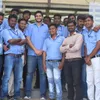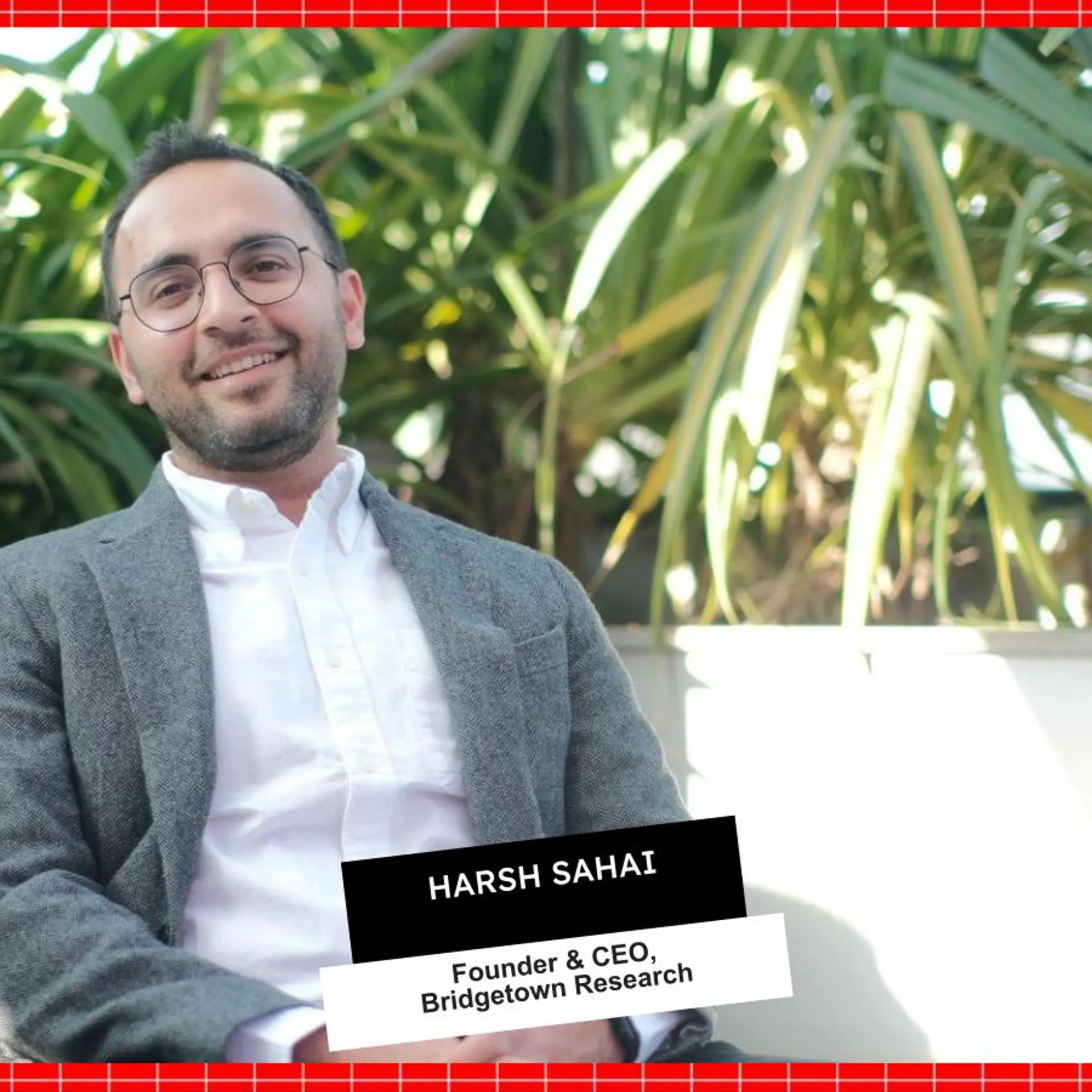Two pivots, 4 near-deaths: How FarMart pulled through
SaaS-led B2B food supply platform FarMart is Alekh Sanghera and Mehtab Singh Hans’ third innings. It now has some top investors, and about 90,000 retailers connected to 2 million farmers.
“We (Founders) will be taking a 70 percent salary cut or maybe not drawing our salaries, for the next few months. An emergency pool of Rs 10 lakh has been set for everyone. We will all get through this tough time.”
It was nerve-wracking 30 minutes in the lives of Alekh Sanghera and Mehtab Singh Hans, Co-founders at , when they announced pay cuts amidst a business slowdown post-pandemic.
What came as a surprise, and relief, was when the 50-member team took a voluntary 25 percent pay cut. “They took a bet on us,” the grateful co-founders recall. No one was let go, capital was conserved, and the emergency fund remained untouched.
Embarking on the journey that entrepreneurship is, you prepare for the worst. While some founders fall into the pool of fear and question their own beliefs when things go haywire, victory belongs to those who pull themselves together, take tough and smart decisions, and get up to get going.
Childhood friends-turned-co-founders Alekh and Mehtab are among those who have weathered many storms. They refused to go home when their first two business models—a tractor marketplace and an agri fintech platform—didn’t succeed.
Starting from the ground once again, their third inning, a SaaS-led B2B food supply platform, today has some of the top investors on its cap table, and about 90,000 retailers connected with two million farmers, across 600 districts.
From term sheets being pulled out to undergoing severe depression, the duo has been on a “road of hell to find their path to heaven” for the past seven years, when they decided to take the entrepreneurial plunge with FarMart in 2015.
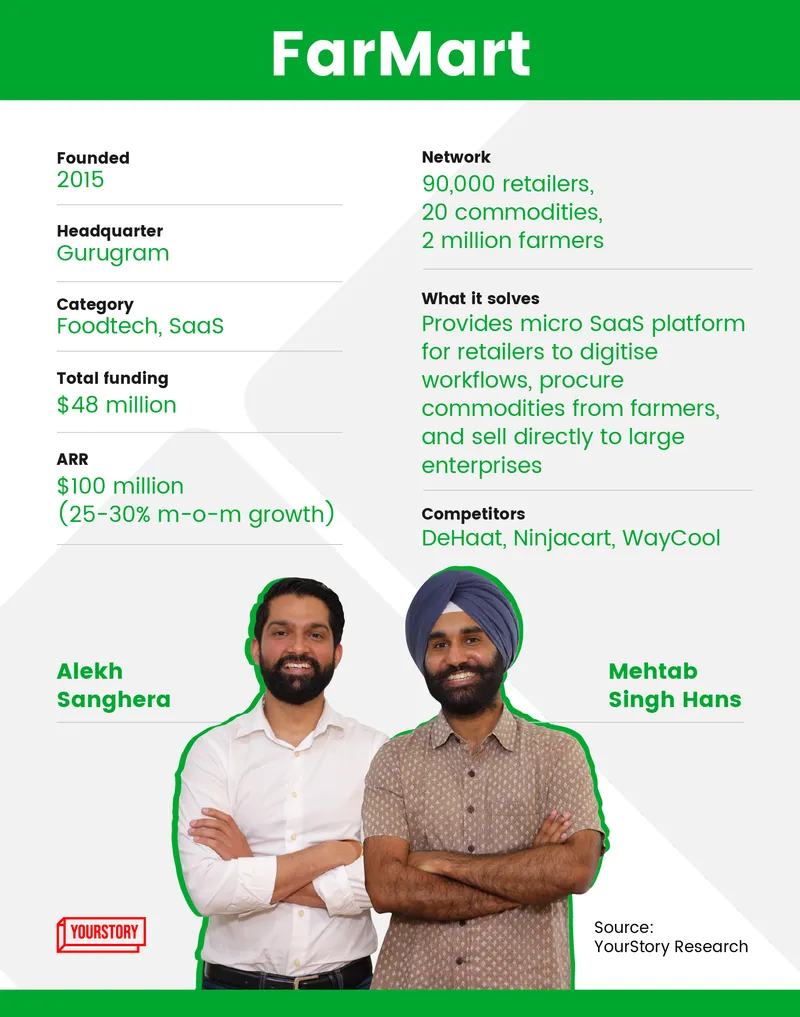
The “be our own boss” streak: Incorporating FarMart
Alekh and Mehtab’s 16-year-long association goes back to school. While the former comes from an army background, the latter hails from a family of farmers in Punjab.
After completing engineering courses, they moved to Bengaluru to work as consultants in MicroSave and Goldman Sachs, respectively, while continuing to brainstorm over new business ideas.
“We were not tech wizards or the smartest ones in the room but we had a problem-solving brain,” says Alekh, who, along with Mehtab, had an added sense of understanding around the prevalent gaps in the farming community. One of the major issues they noticed was the lack of access to sophisticated farm equipment for marginal farmers.
Following initial research and farm visits, the 24-year-olds quit their jobs in December 2015, moved to a small town in Saharanpur district of Uttar Pradesh—Chhutmalpur—and started a pilot project with five tractors.
Alekh’s former boss Lokesh Singh also joined the fledgling business.
The startup operated as an ‘Uber-like aggregator’ and rented out farm equipment on a pay-per-use basis. It charged 10-15 percent of commission on every transaction. The business started out with 10 machinery owners, and reached about 400 customers within eight months.
After 12 months of being operational, the startup got its first big jolt in November 2016: demonetisation. This had a huge impact on its financials and about 40 percent of the investor base, which had offered the term sheet earlier in July, pulled out.
“It was crazy. We shifted our office, moved to a shady building with no proper amenities, saved every penny and put ourselves through some really tough times. It was for the first time we faced rejection and it came as a reality check,” Alekh says.
Wading through external shocks, the startup managed to stabilise operations following a seed round from Indian Angel Network (IAN) and LetsVenture in March 2017, and eventually managed to rope in 5,000 customers and over 300 machinery owners.
However, a bigger problem was brewing on the product side.
“We got hard-slapped by our users, who could neither afford smartphones nor were proficient at using our app. The takers for the app became stagnant and you can’t operate long term without repeat customers,” recalls Mehtab, adding the limitation of the business model in adding value to the drivers/farmer’s existing situation.
For the first-time entrepreneurs in a nascent market, the biggest learning was one: “Don’t try to sell anything to farmers, rather buy from them or help them sell.”
Reload and reset: Model 2.0
By 2018, the co-founders decided to pivot FarMart to an agri-fintech model, and entered the lending segment. All resources were absorbed while the existing investors continued to place their bets on the founder’s second innings.
“Lending was an extension of our first business model. We had seen farmers operate up and close, and access to credit was the ongoing issue,” Mehtab says.
Using their proprietary credit underwriting model, FarMart offered small-ticket loans to farmers via lending institutions, including Happy Loans and Arth Impact among others. It used a ‘closed-user-group’ lending model, wherein loans were given to a group of individuals within an area. In case of non-payment of dues by any one farmer, the community could help the company recover loans. The farmers also had the option to pay in the form of produce to FarMart’s market linkage partners.
Though the fintech business model was successful, it had started to emerge as a regional microfinance play, which “didn’t excite” the founders. They had gotten a sense of its limited scale besides other issues.
The founders were still contemplating their next move to descale the business, when they were hit by the NPA problem, and their financials eventually went into the red.
“It was brutal,” says Alekh, recalling the time he suffered from severe depression and anxiety.
For the second time, the term sheet was pulled out at the last minute, and the founders were left with cash flow of just 60 days. They pumped in their personal savings and borrowings of Rs 50 lakh to sustain operations.
“We said to ourselves, ‘Dekha jayega’,” he adds.
By December 2019, the team gradually descaled the loan book, and saved the incoming collections to fund their next product, which they had been mulling over for some time.
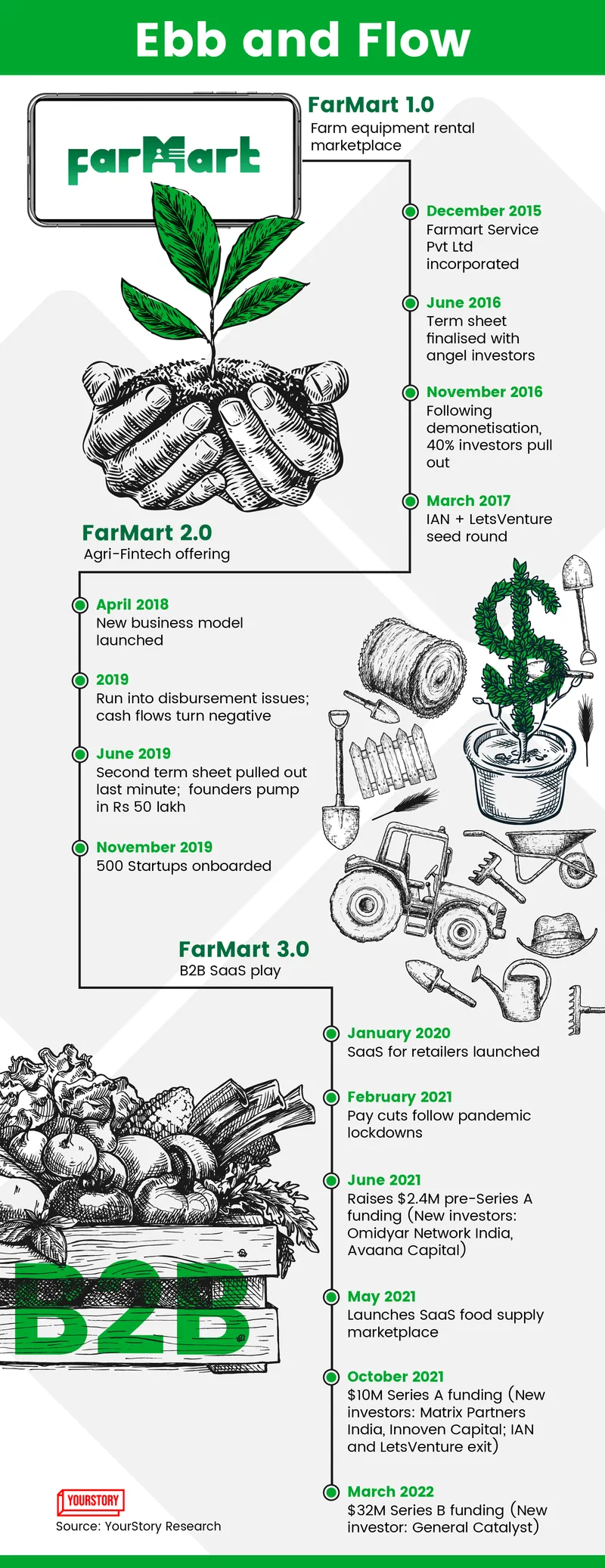
Getting through tough times
There is a saying in the startup community—if you survive five near-death experiences, it is very likely that you will survive anything.
By now, the co-founders had survived four—demonetisation, term sheets being pulled out twice, and a negative cash flow.
“We thought what the hell are we doing? Are we just ruining our lives? At one point I thought I was going to have an attack and die. There were times when we used to get scared driving to our office, thinking how we were going to pay the dues,” Alekh says.
How did they get through? The childhood friends go back to their boarding school days at The Lawrence School, Sanawar, and its motto, ‘Never give in’.
“It’s gotten embedded in our DNA. We just don’t know how to give up and always find a way out. It’s sometimes frightening to see the amount of pain we endured during that course,” Mehtab says.
Citing stark similarities in the environment within which entrepreneurs and sportsmen operate, Alekh and Mehtab, both avid sports junkies, connect their obsession with teamwork and the “play to win” streak, to their sports life as students.
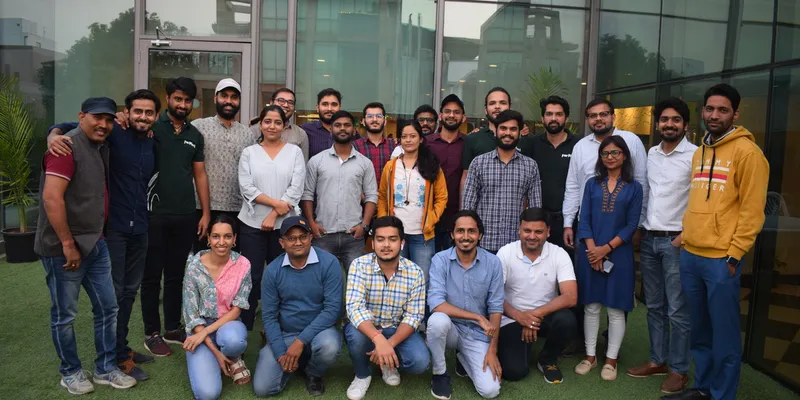
Team FarMart
Catching the tailwind: Model 3.0
FarMart made its second pivot in January 2020, with the launch of a B2B SaaS platform for retailers. The new line was launched merely two months before the pandemic was declared. To preserve cash, the company announced pay cuts for some, including founders, for almost 12 months, before it raised its pre-Series round in June 2021.
It got new investors, including 500 startups, Omidyar Network India, Matrix Partners India, Avaana Capital Innoven, and General Catalyst, onboard and has raised about $45 million, to date, in three rounds.
Apart from digitising their workflow, the platform enables retailers to procure commodities from farmers (aggregated and sourced by FarMart) and sell directly to large enterprises via the platform.
It claims to have built a network of 90,000 retailers, connected with B2B buyers like ITC, Olam and Cargill, selling across 20 commodities procured from two million farmers.
“Our current annualised revenue run rate stands at $70 million with a 25-30 percent month-on-month growth,” the co-founder says.
The startup aims to become a pan-India sourcing platform and is looking to expand in 12 states besides going export-heavy in the next one year.
Accommodating investors
The founders claim that all this while the investors were quite accommodating with FarMart and continued to bet on their vision.
But it wasn’t hunky-dory all the time.
Alekh recalls an incident when a particular investor lost his temper during a discussion around the second pivot, post the due diligence.
This led to Alekh barging out of the VC’s office, holding on to his convictions and faith in the business idea.
It is important to mention here that FarMart’s investors during the first two business models were mostly early-stage VCs/angels, who typically have a larger risk appetite. Its previous investors IAN and LetsVenture got an exit of 35-50X, during the Pre-Series A round.
On the question of extra scrutiny by VCs during fundraising, Alekh says, “Every fundraise is difficult. Over the years, we have gathered data points and deep insights, and have done almost everything under the sun. We pulled up consistent numbers for a year and raised our growth rounds.”
The founders even claim to have declined a new investment of $500,000 as the vision of the investor did not match.
“The confidence level goes really high when you find your PMF (product-market fit), as founders,” Mehtab says.
The duo gives a shout-out to Madhav Tandan, Principal, Investments at Omidyar Network India, who has been with the founders since inception and has pushed them through some tough times.

Mehtab (third from left) and Alekh (second from right) during their boarding days at The Lawrence School, Sanawar
Normalising failure
In a world where businesses are celebrated for raising funding, touching astounding valuations or crossing the billion-user mark, it is equally important to normalise failure.
Being an entrepreneur is not everyone’s cup of tea. It takes immense courage to get out of the comfort zone and take a risk without a guarantee of success.
“Just hearing the line—it's ok if it doesn’t work out—is comforting. And it’s not just for startups. We still haven’t normalised failure. But you have to give a tough fight,” Mehtab says.
Counting their blessings, the entrepreneurs touch upon the need for a strong social support system.
It has been an exhaustive yet gratifying journey for the co-founders, whose only regret is not being “completely honest” with themselves during the early days.
“We regret not taking some early calls. You know something is not working but you fear pulling the plug,” the duo signs off.
Edited by Teja Lele and Jarshad NK



